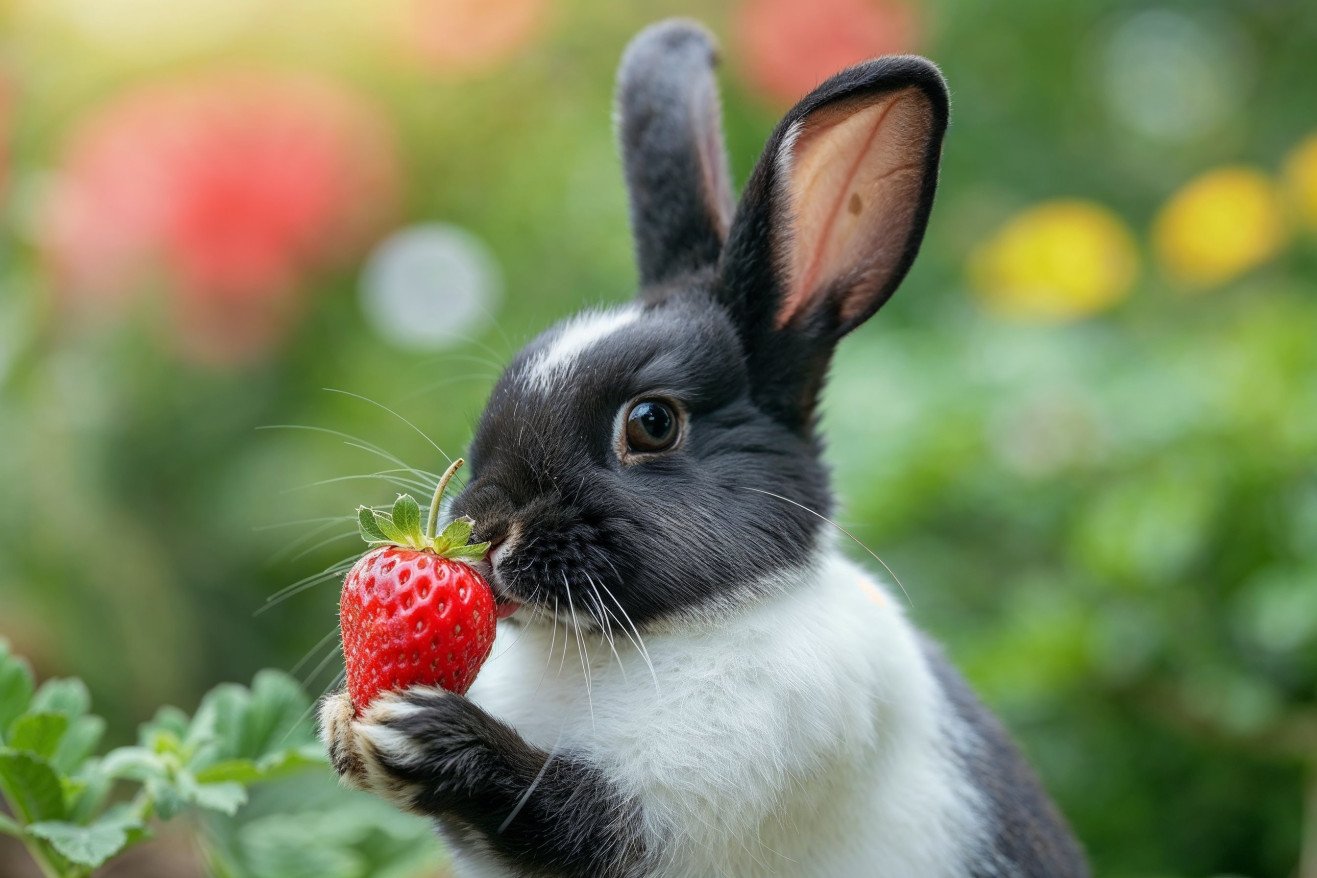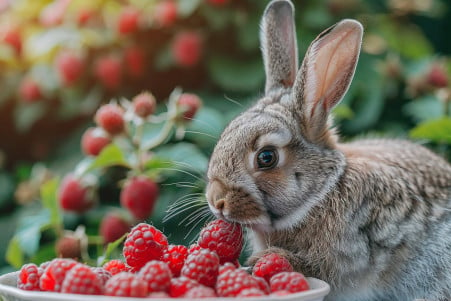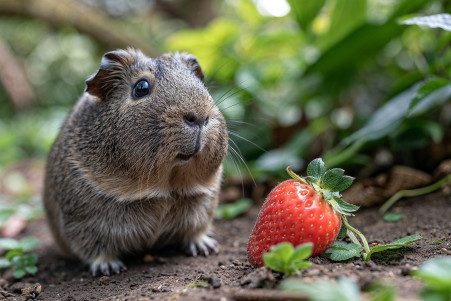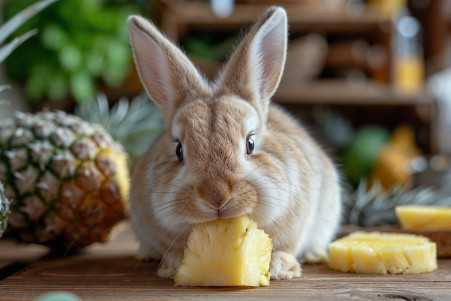Can Rabbits Eat Strawberries? A Guide to Safe Snacking
31 January 2024 • Updated 6 February 2024

While strawberries are a popular fruit for humans, you may be wondering if they’re a good choice for your pet rabbit. Due to their high sugar content, rabbits can eat strawberries in moderation as a special treat.
Most veterinarians suggest feeding rabbits a few small pieces of strawberry no more than once or twice a week, and it’s important to make sure the strawberries are fresh and have been washed to avoid potential health problems.
This article will explore veterinary perspectives and nutritional information to help you learn more about where strawberries fit into a rabbit’s diet. We’ll use the biological impact of sugar to help determine how many treats rabbits should have. We’ll also look at how fruits like strawberries can affect rabbit diets, so you can make informed decisions about your pet’s care.
Can rabbits eat strawberries?
Enjoying Strawberries Safely: What to Know About Rabbit Nutrition and Treats
While the nutritional value of strawberries is important to keep in mind, there are other factors to consider when thinking about feeding strawberries to your rabbit. Strawberries are high in vitamin C, manganese, and antioxidants, all of which are good for a rabbit’s health.
As Rabbit Care Tips explains, strawberries are low in calories and high in essential vitamins and minerals, which makes them a good treat for rabbits. Strawberries are also high in fiber, which is important for a rabbit’s digestive health.
In addition, strawberries are made up of a lot of water, which can help rabbits stay hydrated, especially in the summer.
However, DodoVet and A-Z Animals point out that strawberries should be fed to rabbits with caution because of their sugar content.
While strawberries have less sugar than some other fruits, they still have a lot of sugar, which can lead to weight gain and digestive issues if rabbits eat too many of them.
How to Make Sure Your Rabbit Has a Healthy Diet
Knowing what a rabbit needs in their diet is important for making sure that they live a long and healthy life. The RSPCA explains that fresh, high-quality hay is the most important part of a rabbit’s diet because it helps with digestion and dental care. In addition to providing the fiber that rabbits need, grass and hay also help rabbits keep their teeth at a healthy length.
In addition to hay, rabbits should be given leafy greens every day. VCA Animal Hospitals explains that rabbits should also be given a small amount of fresh vegetables and a specific amount of pellets based on their body weight to make sure that they get all of the nutrients that they need. However, it’s important to be careful with pellets because they can lead to obesity if rabbits are given too many.
While rabbits can eat treats like strawberries, they should only be given in small amounts. The Merck Veterinary Manual explains that because fruits are high in sugar, they should be added to a rabbit’s diet in moderation. To avoid dental and digestive problems, treats should make up no more than 10% of a rabbit’s diet.
The Merck Veterinary Manual cites research that shows that the fiber content of a rabbit’s diet is very important, explaining that a rabbit’s diet should contain at least 15% crude fiber. This is important for maintaining gut health and good digestion.
When adding fruits like strawberries to a rabbit’s diet, it’s important to make sure that you’re keeping these dietary guidelines in mind so that you can make sure that your rabbit has a varied diet without sacrificing their basic nutritional needs.
Sugar and Its Impact on Rabbit Health
Strawberries can make a tasty snack for rabbits, but their sugar content means that they should be given in moderation. Rabbits process sugars and starches differently than humans, and if they consume too much of them, they can become overweight, which is a risk factor for more serious issues like diabetes.
In her research on rabbit health, Frances Harcourt-Brown explains that while fruits and root vegetables are not toxic, they are fattening and unbalanced in their nutritional content, and therefore should only be given to overweight rabbits in small amounts.
Rabbit dental health is another important consideration. The Australian Veterinary Association explains that low-fiber, high-carbohydrate diets are a major cause of dental disease in rabbits because they lead to overgrown teeth. Since rabbits’ teeth grow continuously, they need to eat fibrous foods to keep their teeth at a healthy length.
Rabbits have a digestive system that includes a caecum that ferments food, and it is designed to process high-fiber foods. As a result, owners should feed their rabbits sugary foods like strawberries sparingly because their digestive systems are not equipped to handle high concentrations of sugar. According to Harcourt-Brown, this can lead to digestive upsets or, in more severe cases, conditions like enterotoxaemia.
Healthy rabbit diet recommendations suggest that owners avoid sugary treats and instead focus on feeding their rabbits high-fiber foods. By learning about the impact of sugar on rabbit health, owners can make better choices about the treats they give their pets, which will help them ensure that their rabbits eat a balanced diet and live a long, happy life.
Healthy Snacking: How to Feed Your Rabbit Strawberries
If you want to feed your rabbit strawberries, it’s important to do so in moderation and with care. Rabbit Care Tips suggests that one to two tablespoons of strawberries, which is about the size of one medium strawberry, is a good amount to feed an adult rabbit two to three times a week. If you have a smaller rabbit, you should adjust the portion size accordingly to avoid overfeeding.
Like any new food, you should introduce strawberries to your rabbit slowly. You can start by giving them a small piece to see how they react, but you should be aware that rabbits have sensitive digestive systems. Vital Pet Club also notes that you should be sure to introduce strawberries to your rabbit slowly to avoid causing them gastrointestinal issues.
When it comes to preparing strawberries for your rabbit, Rabbit Care Tips and Vital Pet Club both recommend that you keep it simple and make sure to wash the strawberries thoroughly to remove any pesticides or chemicals. You can also reduce the risk of exposing your rabbit to harmful chemicals by feeding them organic strawberries.
To make sure that your rabbit’s treats are well-rounded and that they’re getting a good mix of different foods, you can alternate feeding them strawberries with other rabbit-safe treats like dandelion leaves, carrots, and small pieces of cucumber.
This will help keep your rabbit’s diet exciting and ensure that they’re getting a good mix of nutrients. If you follow these guidelines, you can make sure that you’re feeding your rabbit strawberries in a way that’s safe and healthy.
Conclusion: Strawberries and Bunnies
As discussed in this article, strawberries can be a healthy addition to your rabbit’s diet if they are given in moderation. Strawberries are packed with important nutrients like vitamin C and manganese and can help keep your rabbit hydrated because they are made up of mostly water.
However, it’s important to make sure that you are only giving your rabbit a small amount at a time to avoid the potential health problems that can come from the sugar in strawberries.
A healthy diet for your rabbit includes hay and leafy green vegetables that are high in fiber, along with the occasional pellets. Strawberries should be an occasional treat and not a regular part of their diet.
When introducing strawberries to your rabbit’s diet, do so slowly to allow their digestive system to adjust. Additionally, be sure to wash the strawberries thoroughly to ensure your rabbit is consuming the freshest, healthiest produce.
Taking care of a rabbit means making sure that you are feeding them a healthy diet that includes the right balance of nutrition and treats.
In conclusion, being a good pet owner means that you are making informed decisions about your rabbit’s diet. By making sure that your rabbit’s diet is primarily made up of hay and leafy green vegetables and that strawberries are only given to them as an occasional treat, you can make sure that your rabbit lives a long, healthy life.


